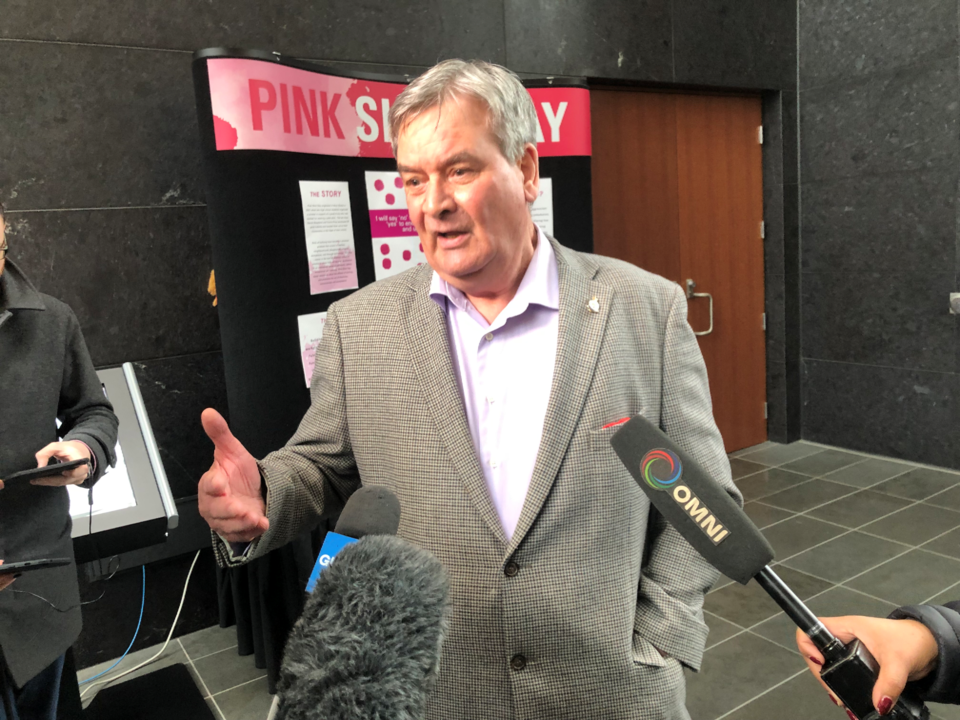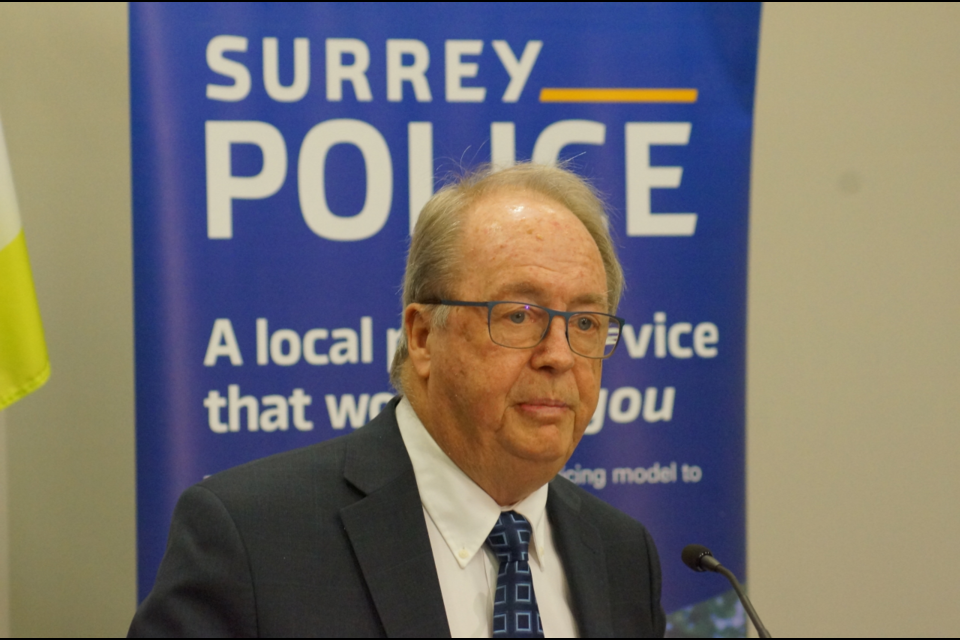The B.C. government's announcement that the City of Surrey will form a municipal police board won praise from the city's mayor but has also spurred a political backlash from opponents of Surrey's move to transition away from policing by the RCMP.
Surrey Mayor Doug McCallum described the announcement Thursday as вҖңDay 1 of the Surrey police force.вҖқ
McCallum said recruitment of officers has already begun and the city has already chosen Bob Rolls, retired deputy police chief for the City of Vancouver, as its city-appointed board member вҖ” one of seven founding board members, which also includes the cityвҖҷs mayor and five appointees of the Minister of Public Safety and Solicitor General.
Speaking to media at Surrey city hall, McCallum thanked the current minister Mike Farnworth as well as Premier John Horgan, whose government is already facing political blowback for the decision to approve the police force.Мэ
While the decision has divided local residents, McCallum continued to reiterate the mandate he was given as the elected mayor and as a candidate who clearly campaigned for the Surrey Police Department.
вҖңThatвҖҷs why politicians run. They put their programs out, they get elected, they stay with it, they vote on it and they achieve it. ThatвҖҷs what our residents want,вҖқ saidМэ McCallum.
Surrey is the biggest city in Canada with a local RCMP detachment, noted McCallum, who contends a municipal force will provide for greater local decision making and control and a force that is more rooted in the community (as opposed to the RCMP, a federal entity that sees frequent transfers of officers and trains recruits in Regina).
Farnworth said Thursday that he is aware of the controversial decision, which only amplified following an austerity budget passed last December by McCallumвҖҷs slate to keep tax increases low while still paying the estimated cost of $45 million for the transition.
вҖңThere are strong views on both sides of this issue. IвҖҷm under no illusions,вҖқ said Farnworth, who reiterated his role is to simply oversee the transition process to maintain public safety.
вҖңThe City of Surrey is democratically elected and has taken that decision,вҖқ said Farnworth, via teleconference, referring to a unanimous council vote in November 2018 to turf the RCMP.
вҖңPolicing is a local government responsibility. They are the ones to decide.вҖҰ My job is to ensure the transition is done properly.вҖқ
The NDP controls six of nine provincial seats in Surrey, flipping three of them from BC Liberal control in the 2017 election.
Any unforeseen transition costs will be borne by Surrey, said Farnworth.
McCallum said the city force would maintain a contract with some of the RCMPвҖҷs regional units, such as the Integrated Homicide Team. It is understood the city force can, in the future, establish its own homicide investigation squad, as like Vancouver.
Following McCallumвҖҷs 25-minute speech and question and answer event with media Thursday morning, Coun. Linda Annis вҖ” among four councillors now opposed to the transition after once voting for it вҖ” said it was a вҖңdisappointingвҖқ day for Surrey.
вҖңThe residents have been talking loud and clear that they do not want to transition away from the RCMP.вҖқ
Annis said about $129 million is being spent on the transition (estimates including transition costs plus increased operating costs over five years).
вҖңThis is money that could be going into rec centres, more police officers, more fire fighters. ItвҖҷs not good utilization of taxpayers money,вҖқ Annis said.
Coun. Stephen Pettigrew, an independent council member following a split from McCallumвҖҷs slate, took aim at Farnworth for approving the transition.
вҖңIвҖҷm of the opinion that the NDP, itвҖҷs time for them to go. ItвҖҷs time for them to leave the city of Surrey; they do not represent the wishes of the people and theyвҖҷve lost their chance to remain here.
вҖңTheyвҖҷre going to pay the price for this,вҖқ said Pettigrew.

Paul Daynes, a co-organizer of a вҖңKeep the RCMP in SurreyвҖқ petition, spoke outside the locked media room.
вҖңOur message for Minister Farnworth is, this is not without consequence to him and his government. We will be actively campaigning in the run up to this election and we will not support any MLA that does not support one of two things: giving people in Surrey a say or retaining the RCMP in Surrey,вҖқ said Daynes in reference to a referendum the group had been calling for.
вҖңWeвҖҷll campaign against the NDP in the next provincial election,вҖқ said Daynes.
His group purports to have a petition signed by 40,000 people. The petition was sent to Premier John Horgan, who may choose to read it to the Legislature, or not.
The petition could be signed by any B.C. resident as long as it was signed in Surrey, according to the groupвҖҷs petition rules. It does not appear to be a formal petition to the B.C. Legislature. Glacier Media has attempted to understand the vetting process of the petition and what sort of official standing it has, however the governmentвҖҷs communications staff have yet to respond.
Daynes said the costs of transition have come at a toll to the city.
вҖңTheyвҖҷve cut back on social programs and infrastructure to pay for this nonsense,вҖқ he said of McCallumвҖҷs plan.
He said McCallum doesnвҖҷt have a mandate to axe the RCMP because he only got 41 % of the popular vote.
He said McCallum displays вҖңdictatorial mini Trump-like behaviour.вҖқ
The transition process has been laid out by a report to Farnworth from the Provincial Municipal Policing Transition Study Committee, chaired by former Attorney General Hon. Wally Oppal.
Oppal said the transition timeline of getting SurreyвҖҷs department operable by April 2021 is вҖңambitious.вҖқ
Farnworth said OppalвҖҷs report may be made public next week.
The provincial government outlined the next steps to appoint five board members, who, along with Rolls and McCallum, will hire a police chief.
First, the ministry will initiate the process by posting a notice of position online to recruit prospective candidates. Ministry staff will interview candidates and provide a list of recommendations to the director, who will then conduct secondary suitability interviews.
It is less clear how Surrey determined its board member Rolls. Annis said the decision was made in a closed council meeting where a вҖңmajorityвҖқ approved of Rolls upon a recommendation. She said she couldnвҖҷt say anything more beyond that.
Meanwhile, Surrey RCMP Assistant Commissioner (police chief) Brian Edwards released an email statement Thursday indicating the detachment is in the dark on the process.
вҖңI have not seen the report done by the Provincial Municipal Policing Transition Study Committee, so I cannot comment on the process ahead, timeline, or policing structure during a transition," Edwards said. "I hope to be brought into those conversations in the weeks and months ahead so I can ensure the safety of Surrey residents and the wellbeing of members and employees throughout this process."
Edwards expressed вҖңrespectвҖқ for municipalities to choose their own form of policing.
After her comments to media, Annis, the only elected member of council not in McCallumвҖҷs slate, released an email statement: вҖңA Surrey police department cannot be created behind closed doors and we really have to ask ourselves about what extra value weвҖҷre going to get from the SPD.вҖқ
Мэ
Мэ
Мэ



